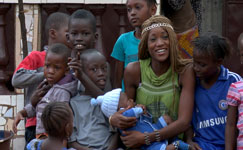Ebola survivors share life-saving tips via mobile app
8 January 2015
Ebola survivors in West Africa are connecting with each other and sharing public
health advice, as well as speaking about the challenges they face in post-recovery,
using an interactive mobile app available through #ISurvivedEbola, the ground-
breaking West African multimedia campaign.
The innovative digital tool debuted in Guinea on 5 January, piloted by the first
Guinean survivor to share her story with the #ISurvivedEbola campaign. The website
also houses the stories of a growing community of Ebola survivors from Liberia, Sierra
Leone, and Guinea.
In the first message sent via the mobile app, Camara "Fanta" Fantaoulen said: "Yes, I
survived Ebola, thanks to the help of the brave health care workers who treated me.
And I've learned that together, we can defeat this virus and protect our families and
communities."
After losing her father and five other family members to suspected or confirmed
Ebola, Fantaoulen
believed her death was imminent when she tested positive for the
virus. Thanks to a combination of early treatment, strict adherence to her treatment
plan, and sheer determination, she recovered from the virus and is now providing
psychosocial support to Ebola patients.
Survivor stories
The mobile app is the latest component of the #ISurvivedEbola campaign, which
leverages survivor stories from Liberia, Sierra Leone, and Guinea to deliver vital public
health information about Ebola to affected populations, and to reduce the stigma
faced by Ebola survivors.
A key way in which the campaign does this is by documenting survivor stories in
video, audio, and print formats; then disseminating these stories broadly via local,
national, and international media, online platforms, and
other distribution channels.
Educational radio dramas that tell fictional yet reality-based stories of survival, and
radio call-in shows that feature Ebola survivors as guests, are among the campaign
activities.
#ISurvivedEbola is part of the #TackleEbola initiative and is implemented by PCI
Media Impact in collaboration with Unicef.
Each survivor who has shared his or her story through the campaign is given a
smartphone installed with the app. This helps them to use the technology to share
information about their lives after recovery. The smartphones and the app were
provided and developed with support from the charity fundraising website
GlobalGiving.
With the release of the app and launch of the website, the #ISurvivedEbola
campaign has completed the first phase of its roll-out. It includes two additional
survivor story videos from survivors in Liberia and Sierra Leone, respectively.
Helping others
The Liberia video
introduces the world to Decontee Davis, a 23-year-old who
overcame Ebola but lost her fiancÚ to the virus. Davis now works in an interim care
centre for children who have come in contact with Ebola patients and are under 21
days of observation. Many of these children have lost one or both parents to the
disease.
From Sierra Leone, audiences meet Aminata Kargbo, a university student who, after
surviving Ebola, has become a leader in efforts to educate others on the benefits of
early treatment.
"We began in early December with the launch of the campaign and release of the first
survivor video out of Liberia," said Sean Southey,
chief executive of PCI Media Impact.
"Then, the campaign launched educational Ebola-focused radio programmes in Liberia
and released the premier survivor story out of Sierra Leone. Now, we have activated
the mobile app, released the first survivor story out of Guinea, and launched a website
that will allow concerned citizens throughout the world to join the movement."
The multiple #ISurvivedEbola campaign products and activities are reinforcing the
existing work being done by organisations like Unicef in Liberia, Sierra Leone, and
Guinea to spread key messages about Ebola to the public.
"While treatment of Ebola patients is critical, the best way to end the Ebola outbreak
in West Africa is to cut the chain of transmission and prevent further infections," said
Rafael Obregon, chief of the communication for development section at Unicef.
"As the global UN lead for the Social Mobilization Pillar of the Ebola response in West
Africa, Unicef is
at the helm of efforts to stop transmission by working with national
governments and partners to educate the public in Liberia, Sierra Leone, and Guinea
about how to protect themselves, their families, and their communities from the
virus.
"#ISurvivedEbola is reinforcing our efforts by providing this information in multiple,
highly entertaining forms, including through the testimonies of actual survivors."
Source: APO
 Ebola survivor Fanta Fantaoulen plays with children in her community in Guinea (Image: Flickr: Greg DeHart, 2014)
Ebola survivor Fanta Fantaoulen plays with children in her community in Guinea (Image: Flickr: Greg DeHart, 2014)




